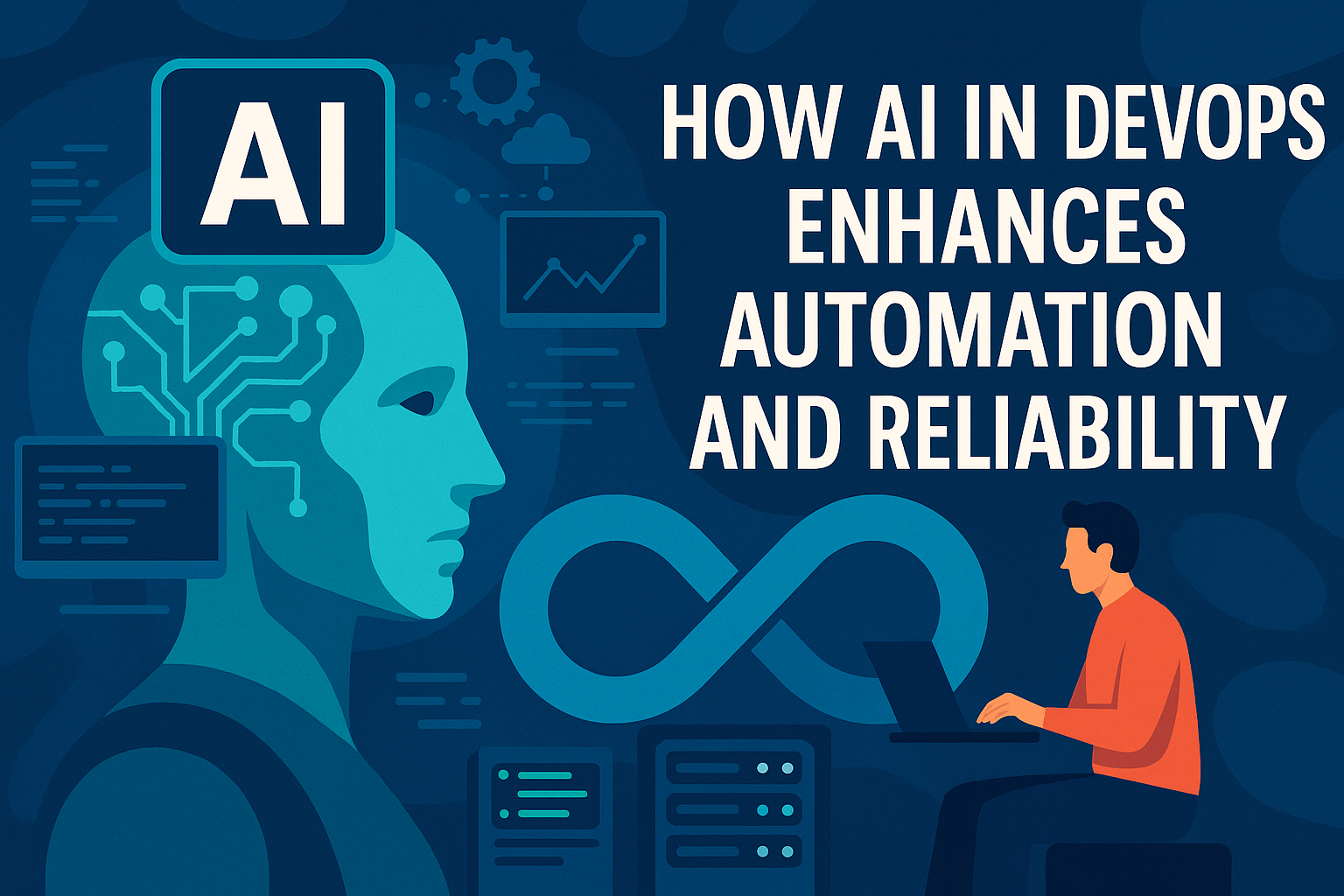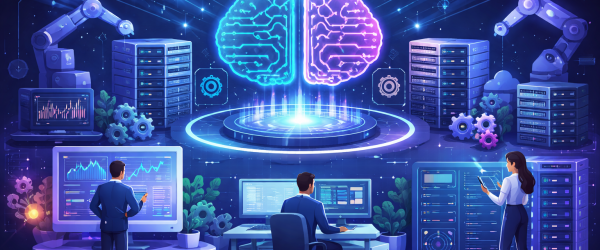Introduction: The Evolution of DevOps with AI
DevOps has revolutionized software development by blending development and operations into a single, streamlined practice. Now, artificial intelligence is pushing this evolution even further. Integrating AI into DevOps isn’t just a tech trend—it’s a strategic move that enhances automation, boosts reliability, and accelerates delivery pipelines.
This article explores seven powerful ways AI supercharges DevOps, transforming it into a self-learning, predictive, and intelligent system.
What is AI in DevOps?
AI in DevOps refers to the application of machine learning (ML), data science, and intelligent automation to various DevOps practices. It introduces cognitive capabilities to pipelines, enabling systems to self-learn from historical data and improve performance over time.
Key Components of AI-Driven DevOps
- Machine Learning Algorithms: For pattern recognition, predictions, and anomaly detection.
- Natural Language Processing (NLP): Helps with sentiment analysis, ticket categorization, and chatbots.
- Predictive Analytics: Offers foresight into potential failures or inefficiencies.
- Automation Tools: Powered by AI to enhance speed, accuracy, and decision-making.
Why Automation is the Heart of DevOps
Automation is the cornerstone of DevOps. From code integration to deployment, automated processes ensure faster and more reliable deliveries.
Traditional vs AI-Powered Automation
| Feature | Traditional Automation | AI-Powered Automation |
|---|---|---|
| Rule-Based | Yes | No (data-driven) |
| Adaptability | Low | High |
| Intelligence | None | Predictive & Learning |
| Failure Recovery | Manual | Automated Recommendations |
AI takes automation to the next level—learning from every cycle to avoid past mistakes and suggest improvements.
Benefit #1: Intelligent CI/CD Pipelines
AI enhances continuous integration and continuous deployment by eliminating manual bottlenecks.
How AI Optimizes Continuous Integration
- Code is tested and validated with intelligent test selection.
- AI identifies frequently failing builds and suggests fixes.
Faster & Smarter Deployment Cycles
- AI prioritizes deployment environments based on usage data.
- Predictive models estimate deployment success probabilities.
Benefit #2: Predictive Incident Management
Downtime is costly. AI helps predict and prevent incidents before they occur.
AI for Anomaly Detection & Root Cause Analysis
- Detects unusual behavior in real-time.
- Uses past incident data to recommend solutions.
- Speeds up mean time to resolution (MTTR).
Benefit #3: Enhanced Monitoring & Observability
Traditional monitoring reacts to alerts. AI makes monitoring proactive.
From Reactive to Proactive Monitoring
- AI scans logs and metrics for early warning signs.
- Integrates telemetry data across multiple environments.
- Visual dashboards highlight future risk areas.
Benefit #4: Smart Resource Optimization
Over-provisioning is expensive. AI helps use resources wisely.
Dynamic Scaling and Cost Management with AI
- AI forecasts load patterns and scales services automatically.
- Reduces infrastructure costs with intelligent utilization.
Benefit #5: Improved Testing Efficiency
Testing is often a bottleneck. AI speeds it up significantly.
AI-Powered Test Case Generation
- Automatically generates test cases based on code changes.
- Learns from past bugs to enhance future test coverage.
- Saves time and improves product quality.
Benefit #6: Better Collaboration through AI Insights
DevOps breaks silos, and AI accelerates that cultural shift.
Reducing Silos Between Dev and Ops
- AI-driven dashboards improve transparency.
- Shared insights lead to unified decision-making.
- Intelligent alert routing reduces confusion.
Benefit #7: Continuous Feedback and Learning
Feedback is vital in DevOps. AI turns it into a growth engine.
Machine Learning for Post-Mortem Analysis
- Analyzes failures and learns patterns.
- Suggests long-term improvements across teams.
- Reinforces a culture of continuous learning.
Challenges and Considerations
While powerful, AI in DevOps also brings challenges:
- Data Quality: AI needs clean, high-quality data.
- Skill Gap: Teams must learn to work with AI tools.
- Overdependence: Blindly trusting AI can lead to critical oversights.
- Security Risks: AI introduces new threat vectors.
🌐 Real-World Use Cases of AI in DevOps
Case Study: Netflix
Netflix uses AI for auto-scaling, personalized content delivery, and failure prediction—ensuring uptime even during massive traffic spikes.
Case Study: IBM
IBM’s DevOps toolchain integrates AI for test optimization, anomaly detection, and deployment planning—enhancing efficiency across global teams.
FAQs: AI in DevOps
1. How does AI improve DevOps automation?
AI analyzes patterns to automate repetitive tasks, optimize workflows, and predict system behaviors, making processes faster and more reliable.
2. Is AI in DevOps only for large enterprises?
No, even small to mid-sized teams can benefit by integrating AI tools for testing, monitoring, and deployment automation.
3. What are the key tools for AI in DevOps?
Popular tools include DataDog, Splunk, Harness.io, and AWS DevOps AI tools.
4. Can AI reduce deployment failures?
Yes, AI predicts deployment risks, tests code more intelligently, and ensures smoother rollouts.
5. Does AI replace DevOps engineers?
Not at all. AI augments human abilities, handling repetitive tasks so engineers can focus on strategic improvements.
6. Is implementing AI in DevOps costly?
Initial setup may require investment, but long-term savings and efficiency gains usually outweigh costs.
Conclusion: Future of AI in DevOps
AI is not just a complementary tool in DevOps—it’s becoming the brain behind smarter decisions, faster deployments, and more reliable systems. As AI continues to evolve, DevOps will become even more autonomous, adaptive, and efficient.
Organizations that embrace AI early will lead the way in innovation, resilience, and customer satisfaction.







